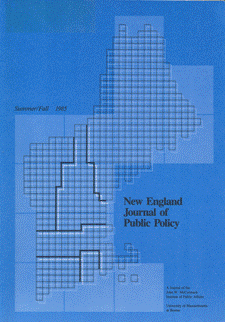Volume 1, Issue 2 (1985)
Central to the evolution of public policy, since all subsequent processes flow from it, is the question of problem identification — or, more broadly, the question of definition. The importance of definition derives not only from the need to address the "right" problem but from the often greater need not to address the "wrong" one, since the subsequent misallocation of resources can alter the nature of the problem itself. More is not always better, whether in reference to federal largesse, nuclear power generating capacity, or the length of the school day. In fact, as the articles in this issue of the New England Journal of Public Policy demonstrate, more is often worse.
Front Matter
Editor's Note
Editor's Note
Padraig O'Malley
Articles
Fiscal Paternalism and New England Cities: A Policy for the Year 2000
Mark S. Ferber and Elizabeth A. Ferber
Urban Public Services: What the Future Holds
Robert Morris
Professor Richardson et al.: A New England Education
George V. Higgins
Teaching--From Occupation to Profession: A Response
Robert S. Peterkin
Getting Power Back: Court Restoration of Executive Authority in Boston City Government
Marcy M. Murninghan
Book Review
Book Reviews: The Endangered Metropolis
Richard A. Hogarty

Editors
- Editor
- Padraig O'Malley